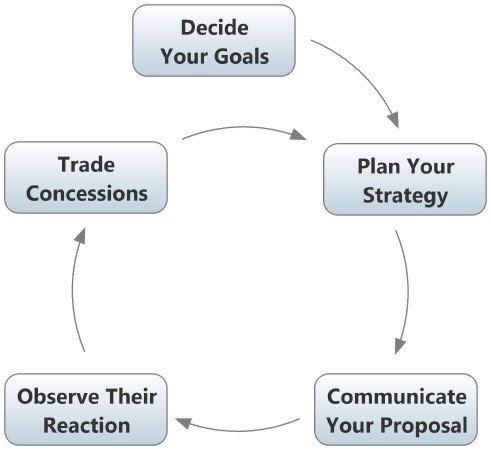What is Negotiation Skills Training?
Negotiation skills training is specialised training designed to give you the skills, knowledge and methods, you need to succeed as a negotiator. The purpose of negotiation skills training is to teach the theory and practice of excellent negotiation skills and therefore, to help people become more successful in their chosen field.
The benefits of the training are twofold:
To eliminate the painful consequences associated with negotiation errors (which are committed by the vast majority of untrained negotiators), such as the error of offering to split the difference.
To make people more successful by replacing such negotiation errors with a wealth of proven negotiation skills.
It is said that, knowledge is power and this training will empower you to become more successful in any professional field of endeavour.
What is the definition of negotiation?
Negotiation is a special form of communication involving two or more individuals or groups, each of which is acting in their own self-interest.
Each party in the negotiation recognises that, to achieve their own self-interest, they need to trade with others, and therefore, they must be able to create and sustain long term, mutually beneficial agreements.
Negotiation is a transaction over which each party has a veto over the final outcome.
In a normal business context, negotiation requires voluntary consent on all sides.
Negotiation is a process by which all parties should achieve a benefit.
Contact Us Today
If you want to know more about this course, or any other Management Training Courses, or their suitability for you or a colleague, call us on 020 3856 3037 or make an enquiry online.
Customer Reviews
Private
Turbine Surface Technologies Ltd
Negotiation Skills Training Availability, Pricing and Course Dates
If you have any questions, please phone us (020 3856 3037) or send us a message.
Bespoke Training (In-House or Live Online)
(International Price Varies)
In-House training has been designed to provide a similar experience to our open courses, however we can tailor the content to fit your specific needs.
Plus, travel and hotel accommodation for trainer if needed (Premier Inn type: not the Hilton!)
We are able to train in your timezone.
All our training includes:
- A full day of quality training, delivered by an experienced trainer
- Total of 6 CPD training hours (9am - 4.30pm), plus an additional 2-3 via post-course online independent learning.
- Full digital interactive course notes
- Training certificate
- Access to additional free training material after the course via our post-course portal
- 3 months free telephone coaching: Whilst you are implementing what you have learned, if you need to, you can contact us for support and guidance
Negotiation Skills Training Course Overview
This course starts with a clear definition of what negotiation is, and what it is not.
Many people only have a hazy conception of the true nature of negotiation, and as a consequence they repeat the same mistakes in every negotiation they enter into.
We develop the full definition and we analyse its component parts. We begin to eliminate the errors caused by a lack of understanding.
We replace errors with essential negotiation skills, which we call the Universal Success Principles of Negotiation.
Every field of human endeavour is guided by a set of related principles. If you don’t know the principles that describe successful action in that subject, then you cannot succeed.
If you do know these principles and if you know how to apply them, then your chances of success improve a thousand-fold.
By the time you finish this course, you will know the success principles of negotiation.
Learning Outcomes:
- How to negotiate mutually beneficial solutions
- Don’t give concessions, instead trade them
- Prepare your negotiation strategy in advance
- How to avoid giving away too much for free
- Perfect your communication style
- How to manage emotions
- Learn about the “games negotiators play”
Negotiation Skills Training Course Details
Morning Session
Introduction - What is negotiation?
What is the definition of “negotiation”?
What is negotiation?
What negotiation is not
The negotiation cycle
Perceived Value
Negotiable variables: Your bargaining chips
Negotiation strategy: entry / exit
What is a BATNA?
Negotiation error 1: Goodwill conceding
Negotiation error 2. Becoming over-emotional
Afternoon Session
Handling the angry call
How to say no
The trader principle
Correct responses to negotiation situations
The games negotiators play
Master communicator: Words, tone and body language
Voice tones
Body language
Common speech habits of Good and bad negotiators
How attitude affects negotiations
Final summary and action plans
Summary and final action plans
Negotiation Skills Training FAQs
How do I join a Corporate Coach Group course?
Is this course offered in-house?
What makes a good negotiator?
Why are negotiations important?
What is the course training method? Is it interactive?
How to negotiate successfully?
What kinds of people attend this Negotiation Skills course?
Companies We've Trained
Related Articles from our People Management Blog
HR's Expanding Scope of Work: Priorities and Challenges for 2025
22 October 2024Prepare for HR priorities 2025. Expanding HR scope, sharp manager development and change training forge strong culture, boost mobility and cut turnover.
Continue Reading >The Teachability Index
12 December 2023Learn what the teachability index is and how boosting your willingness to learn, accept guidance and adapt unlocks continuous improvement and career growth.
Continue Reading >The Aid Feedback Model
19 April 2022Learn the AID feedback model: Action, Impact, Do differently. Give clear, objective feedback that drives behaviour change, engagement and better results at work
Continue Reading >Staff Wellbeing Training
13 July 2021Learn how staff wellbeing training across mindset, habits, culture and environment lifts morale, cuts absence and brings a £5.30 return for every £1 spent.
Continue Reading >












